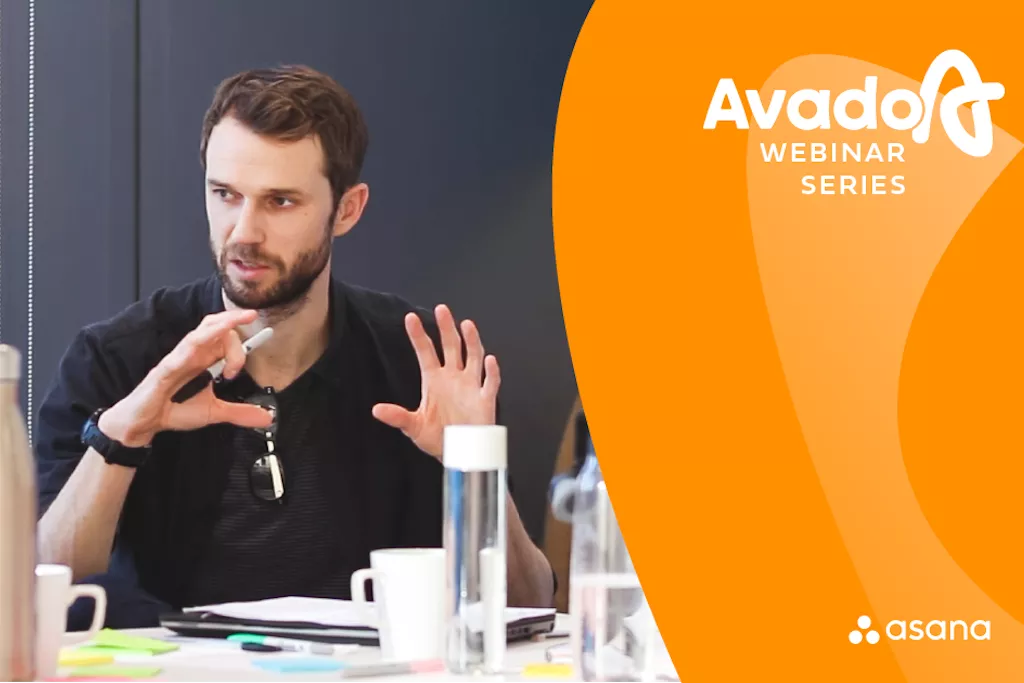Last week, we finished off our webinar series, Unlocking Agility, with our final session, Simple steps and simple tech: Ways to make your team more efficient. Hosted by the journalist and speaker Declan Curry, our panel of experts included Tanya Bagchi, Group People Development Director at L&G; Francesc Artigas, Head of Solutions & Engineering Consulting EMEA at Asana; and Mike Fenna, the Chief Technology Officer here at Avado.
The webinar, which was hosted in partnership with Asana, covered a variety of topics including:
- Thinking big but starting small is the most effective way to create momentum.
- Creating clarity on the ‘why’ of a more agile approach.
- ‘Being agile’ is a better outcome than ‘doing Agile,’ with a test, learn, iterate approach at its heart.
- It’s important to find the approach that’s most appropriate for your team.
- Don’t accidentally over-engineer or spend too much time planning how you bring agile ways of working into the organisation.
- Training people on a new methodology without giving them the opportunity to use it day-to-day rarely works.
- Being agile involves human-to-human connection, so any tech you use to support your agile journey should encourage human connection.
- Transparency, collaboration and empowerment underpin greater agility.
Watch the entire episode below.
As a follow up to this webinar, and the series as a whole, we asked Teresa Rupp, Avado’s Head of Learning and Product Solutions, and Richard Reynolds, Avado’s Product Director, to comment.
We asked Teresa for her advice on adopting a ‘test, learn, iterate’ approach. “Know where the guardrails are,” she said. “By this I mean, part of testing and iterating – a crucial part – is failure. Define up-front which environments are acceptable ones in which to ‘fail fast’ and learn, and which situations are not appropriate for testing.” Teresa also recommended ensuring that all your stakeholders are on board. If your team is ready, but managers or direct reports aren’t, you’ll likely face roadblocks before you can even start.
Richard focused on data to guide identifying and prioritising improvements, with two other key things, as well. The first was early concept validation. “When you put a product into the real world, you can never fully know how it will perform and I will always advocate rapidly prototyping the concept early on and ask friendly customers to feedback on it,” he said. Second was developing an obsession with post-launch. “Having a team of people obsessing on how the product is performing when launched – how do customers or users like it? Are the lead measures you chose at the start of the project performing as expected? Curiosity is a key behaviour needed to test, learn and iterate,” Richard added.
Next, we asked them where they think it’s best to start when adopting a test, learn, iterate approach.
“Mindset is as important (if not more) as technical skill,” said Richard. “Be as excited about learning what is bad as what is good. Don’t see short-falls or negative feedback as failure, but as opportunities to quickly improve.”
Teresa agreed, recommending taking on this mantra: ‘Our goal is not to find the perfect solution/product/etc. Instead, our goal is to test hypotheses that will inform whatever the end state is.’ She explained that testing and iterating can sometimes mean you’ll be looking at imperfect solutions, which can be uncomfortable. But, you’ll see results.
She also added that “It’s easy to get stuck up in the ‘test’ section of the ‘test, learn, iterate’ loop, because ‘testing’ behaviour often feels closest to the work we’re already comfortable with. Be rigorous in actually reviewing and applying learnings, in order to actually begin to close the gap between the current state and your desired end state.”
If you attended any of the sessions in this webinar series, thanks very much for your participation. Stay tuned for more great webinars from Avado as the year goes on. And, for even more info on organisational agility, read our latest report, Why your organisation’s success depends on your approach to learning. From finding the right kind of agile learning to proving the relationship between learning and organisational change, this report offers up invaluable insights to support your organisation’s next steps towards agility.
About Avado
For more than 20 years, Avado have been providing professional training and qualifications that transform businesses. If you see a gap in your own organisational agility, find out how our Agility Academy can help.
 4 min read
4 min read 



